Literature Review: The Role of Social Media in Knowledge Sharing
VerifiedAdded on 2023/06/15
|8
|1739
|394
Literature Review
AI Summary
This literature review examines the role of social media in promoting knowledge sharing and transfer within organizations. It discusses how platforms like LinkedIn, YouTube, and Facebook have transformed individual relationships and created both opportunities and challenges for knowledge dissemination. The review covers key aspects of knowledge sharing, including the types of knowledge (tacit vs. explicit), motivational factors, opportunities for collaboration, and the influence of organizational culture. It also explores various social media technologies and their features, such as communication, collaboration, connection, content competition, and content mixing. Furthermore, the research identifies features that give value to social media, like transparency, immediacy, authenticity, and participation. The review concludes that social media plays a vital role in knowledge sharing and transfer, which is crucial for organizations striving for competitiveness, success, and continuous improvement, aiding in problem-solving and decision-making processes.

THE ROLE OF SOCIAL MEDIA ON KNOWLEDGE SHARING 1
Course name
Name of the professor
Student name
Date
Course name
Name of the professor
Student name
Date
Paraphrase This Document
Need a fresh take? Get an instant paraphrase of this document with our AI Paraphraser
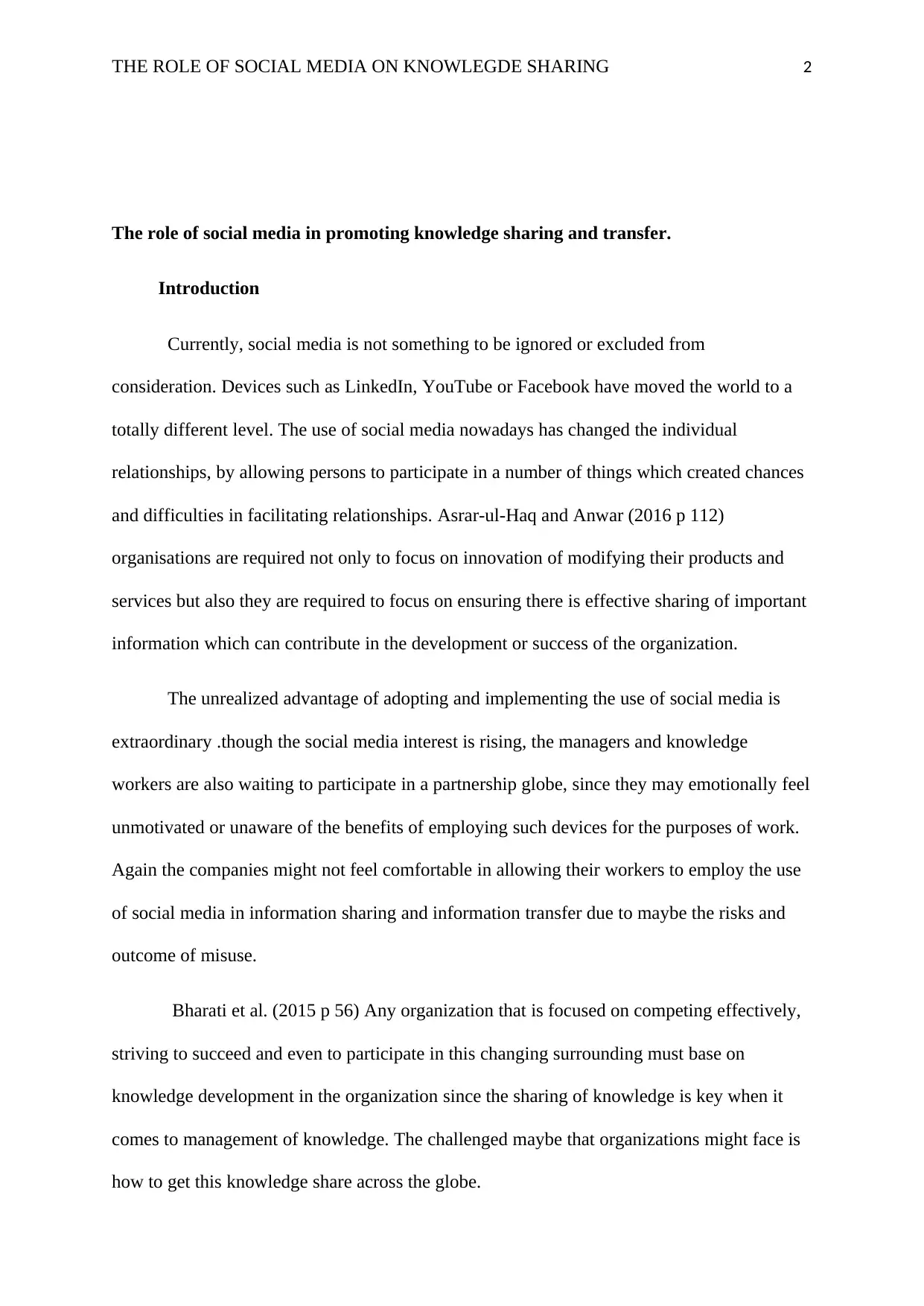
THE ROLE OF SOCIAL MEDIA ON KNOWLEGDE SHARING 2
The role of social media in promoting knowledge sharing and transfer.
Introduction
Currently, social media is not something to be ignored or excluded from
consideration. Devices such as LinkedIn, YouTube or Facebook have moved the world to a
totally different level. The use of social media nowadays has changed the individual
relationships, by allowing persons to participate in a number of things which created chances
and difficulties in facilitating relationships. Asrar-ul-Haq and Anwar (2016 p 112)
organisations are required not only to focus on innovation of modifying their products and
services but also they are required to focus on ensuring there is effective sharing of important
information which can contribute in the development or success of the organization.
The unrealized advantage of adopting and implementing the use of social media is
extraordinary .though the social media interest is rising, the managers and knowledge
workers are also waiting to participate in a partnership globe, since they may emotionally feel
unmotivated or unaware of the benefits of employing such devices for the purposes of work.
Again the companies might not feel comfortable in allowing their workers to employ the use
of social media in information sharing and information transfer due to maybe the risks and
outcome of misuse.
Bharati et al. (2015 p 56) Any organization that is focused on competing effectively,
striving to succeed and even to participate in this changing surrounding must base on
knowledge development in the organization since the sharing of knowledge is key when it
comes to management of knowledge. The challenged maybe that organizations might face is
how to get this knowledge share across the globe.
The role of social media in promoting knowledge sharing and transfer.
Introduction
Currently, social media is not something to be ignored or excluded from
consideration. Devices such as LinkedIn, YouTube or Facebook have moved the world to a
totally different level. The use of social media nowadays has changed the individual
relationships, by allowing persons to participate in a number of things which created chances
and difficulties in facilitating relationships. Asrar-ul-Haq and Anwar (2016 p 112)
organisations are required not only to focus on innovation of modifying their products and
services but also they are required to focus on ensuring there is effective sharing of important
information which can contribute in the development or success of the organization.
The unrealized advantage of adopting and implementing the use of social media is
extraordinary .though the social media interest is rising, the managers and knowledge
workers are also waiting to participate in a partnership globe, since they may emotionally feel
unmotivated or unaware of the benefits of employing such devices for the purposes of work.
Again the companies might not feel comfortable in allowing their workers to employ the use
of social media in information sharing and information transfer due to maybe the risks and
outcome of misuse.
Bharati et al. (2015 p 56) Any organization that is focused on competing effectively,
striving to succeed and even to participate in this changing surrounding must base on
knowledge development in the organization since the sharing of knowledge is key when it
comes to management of knowledge. The challenged maybe that organizations might face is
how to get this knowledge share across the globe.
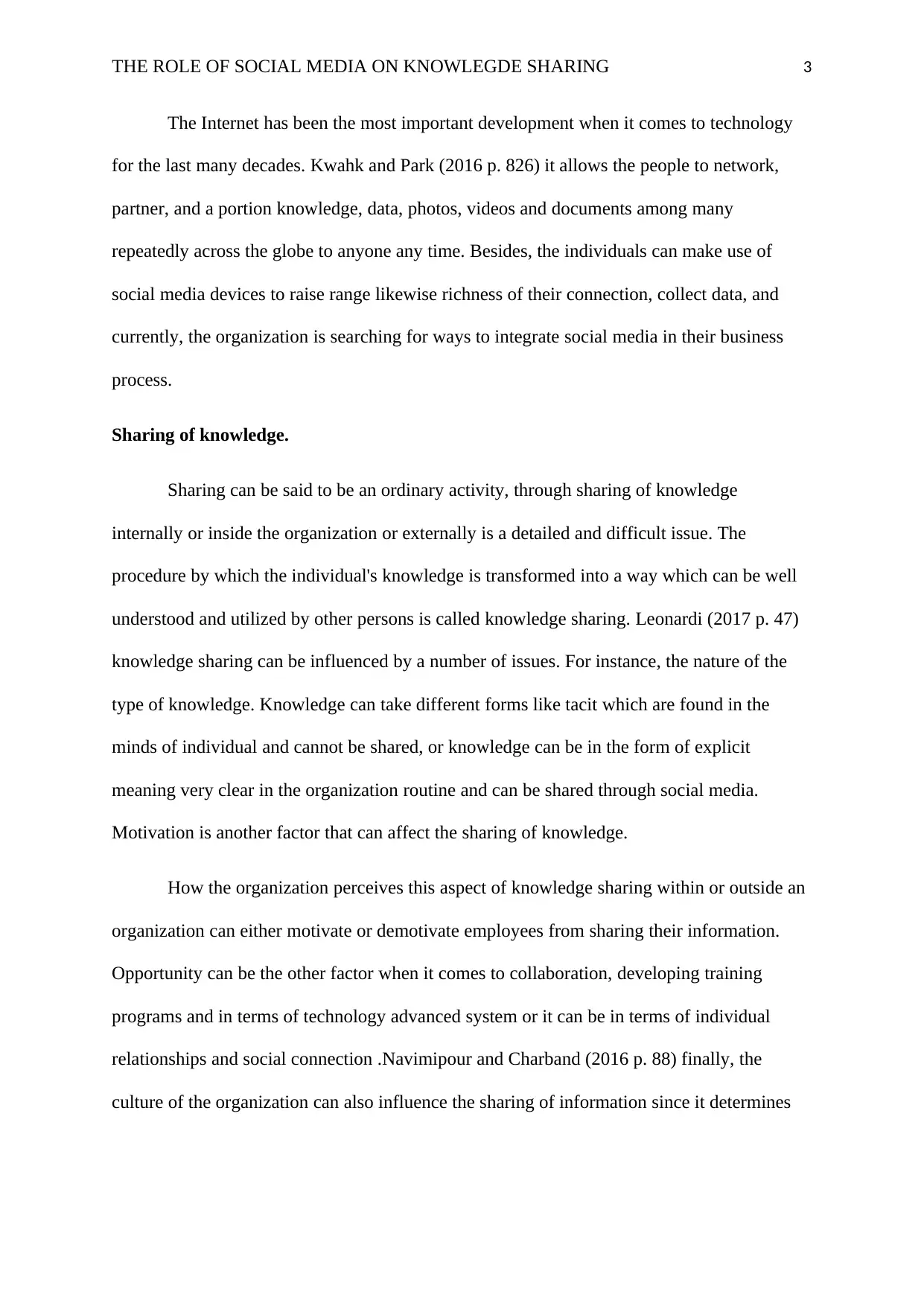
THE ROLE OF SOCIAL MEDIA ON KNOWLEGDE SHARING 3
The Internet has been the most important development when it comes to technology
for the last many decades. Kwahk and Park (2016 p. 826) it allows the people to network,
partner, and a portion knowledge, data, photos, videos and documents among many
repeatedly across the globe to anyone any time. Besides, the individuals can make use of
social media devices to raise range likewise richness of their connection, collect data, and
currently, the organization is searching for ways to integrate social media in their business
process.
Sharing of knowledge.
Sharing can be said to be an ordinary activity, through sharing of knowledge
internally or inside the organization or externally is a detailed and difficult issue. The
procedure by which the individual's knowledge is transformed into a way which can be well
understood and utilized by other persons is called knowledge sharing. Leonardi (2017 p. 47)
knowledge sharing can be influenced by a number of issues. For instance, the nature of the
type of knowledge. Knowledge can take different forms like tacit which are found in the
minds of individual and cannot be shared, or knowledge can be in the form of explicit
meaning very clear in the organization routine and can be shared through social media.
Motivation is another factor that can affect the sharing of knowledge.
How the organization perceives this aspect of knowledge sharing within or outside an
organization can either motivate or demotivate employees from sharing their information.
Opportunity can be the other factor when it comes to collaboration, developing training
programs and in terms of technology advanced system or it can be in terms of individual
relationships and social connection .Navimipour and Charband (2016 p. 88) finally, the
culture of the organization can also influence the sharing of information since it determines
The Internet has been the most important development when it comes to technology
for the last many decades. Kwahk and Park (2016 p. 826) it allows the people to network,
partner, and a portion knowledge, data, photos, videos and documents among many
repeatedly across the globe to anyone any time. Besides, the individuals can make use of
social media devices to raise range likewise richness of their connection, collect data, and
currently, the organization is searching for ways to integrate social media in their business
process.
Sharing of knowledge.
Sharing can be said to be an ordinary activity, through sharing of knowledge
internally or inside the organization or externally is a detailed and difficult issue. The
procedure by which the individual's knowledge is transformed into a way which can be well
understood and utilized by other persons is called knowledge sharing. Leonardi (2017 p. 47)
knowledge sharing can be influenced by a number of issues. For instance, the nature of the
type of knowledge. Knowledge can take different forms like tacit which are found in the
minds of individual and cannot be shared, or knowledge can be in the form of explicit
meaning very clear in the organization routine and can be shared through social media.
Motivation is another factor that can affect the sharing of knowledge.
How the organization perceives this aspect of knowledge sharing within or outside an
organization can either motivate or demotivate employees from sharing their information.
Opportunity can be the other factor when it comes to collaboration, developing training
programs and in terms of technology advanced system or it can be in terms of individual
relationships and social connection .Navimipour and Charband (2016 p. 88) finally, the
culture of the organization can also influence the sharing of information since it determines
⊘ This is a preview!⊘
Do you want full access?
Subscribe today to unlock all pages.

Trusted by 1+ million students worldwide
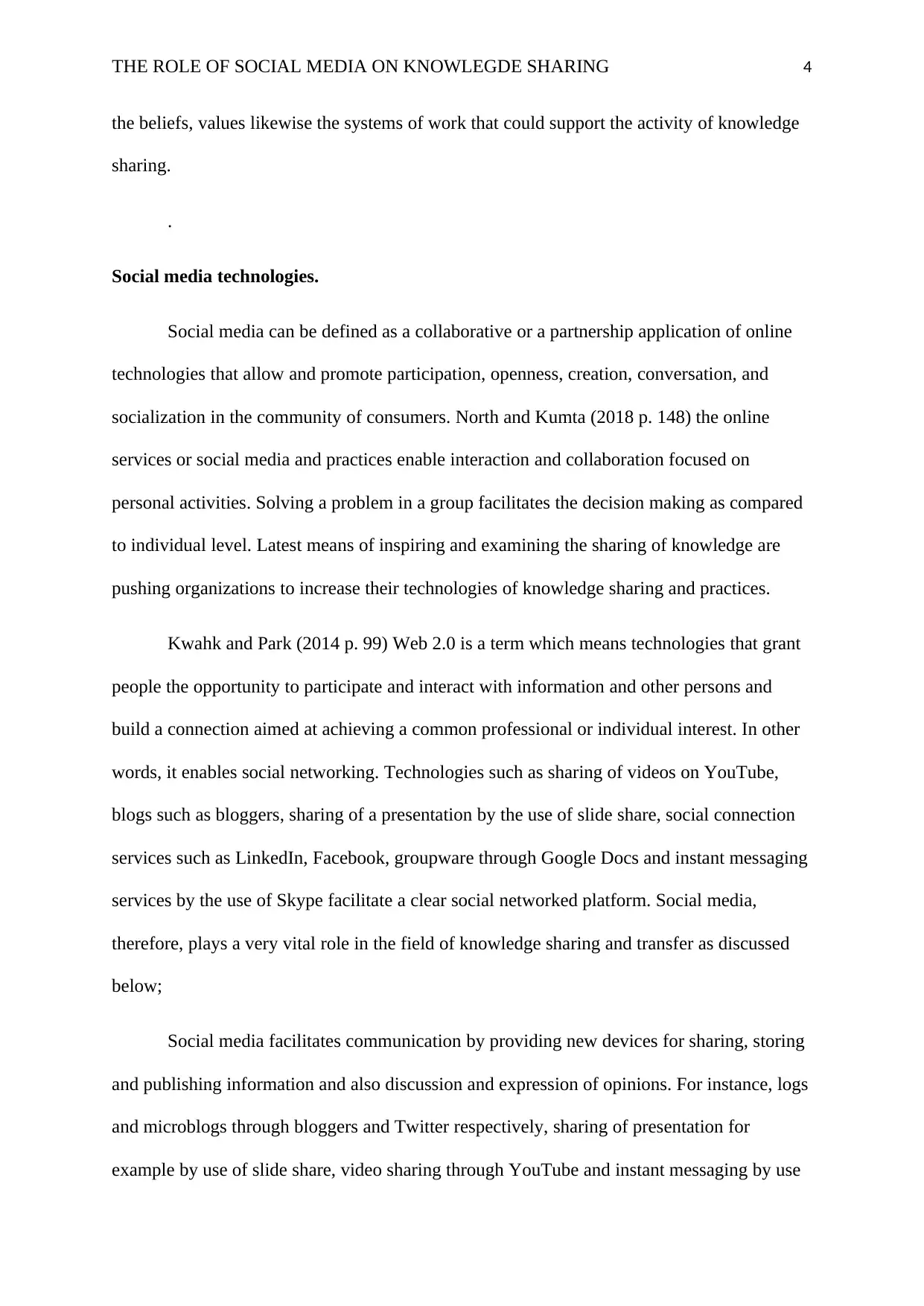
THE ROLE OF SOCIAL MEDIA ON KNOWLEGDE SHARING 4
the beliefs, values likewise the systems of work that could support the activity of knowledge
sharing.
.
Social media technologies.
Social media can be defined as a collaborative or a partnership application of online
technologies that allow and promote participation, openness, creation, conversation, and
socialization in the community of consumers. North and Kumta (2018 p. 148) the online
services or social media and practices enable interaction and collaboration focused on
personal activities. Solving a problem in a group facilitates the decision making as compared
to individual level. Latest means of inspiring and examining the sharing of knowledge are
pushing organizations to increase their technologies of knowledge sharing and practices.
Kwahk and Park (2014 p. 99) Web 2.0 is a term which means technologies that grant
people the opportunity to participate and interact with information and other persons and
build a connection aimed at achieving a common professional or individual interest. In other
words, it enables social networking. Technologies such as sharing of videos on YouTube,
blogs such as bloggers, sharing of a presentation by the use of slide share, social connection
services such as LinkedIn, Facebook, groupware through Google Docs and instant messaging
services by the use of Skype facilitate a clear social networked platform. Social media,
therefore, plays a very vital role in the field of knowledge sharing and transfer as discussed
below;
Social media facilitates communication by providing new devices for sharing, storing
and publishing information and also discussion and expression of opinions. For instance, logs
and microblogs through bloggers and Twitter respectively, sharing of presentation for
example by use of slide share, video sharing through YouTube and instant messaging by use
the beliefs, values likewise the systems of work that could support the activity of knowledge
sharing.
.
Social media technologies.
Social media can be defined as a collaborative or a partnership application of online
technologies that allow and promote participation, openness, creation, conversation, and
socialization in the community of consumers. North and Kumta (2018 p. 148) the online
services or social media and practices enable interaction and collaboration focused on
personal activities. Solving a problem in a group facilitates the decision making as compared
to individual level. Latest means of inspiring and examining the sharing of knowledge are
pushing organizations to increase their technologies of knowledge sharing and practices.
Kwahk and Park (2014 p. 99) Web 2.0 is a term which means technologies that grant
people the opportunity to participate and interact with information and other persons and
build a connection aimed at achieving a common professional or individual interest. In other
words, it enables social networking. Technologies such as sharing of videos on YouTube,
blogs such as bloggers, sharing of a presentation by the use of slide share, social connection
services such as LinkedIn, Facebook, groupware through Google Docs and instant messaging
services by the use of Skype facilitate a clear social networked platform. Social media,
therefore, plays a very vital role in the field of knowledge sharing and transfer as discussed
below;
Social media facilitates communication by providing new devices for sharing, storing
and publishing information and also discussion and expression of opinions. For instance, logs
and microblogs through bloggers and Twitter respectively, sharing of presentation for
example by use of slide share, video sharing through YouTube and instant messaging by use
Paraphrase This Document
Need a fresh take? Get an instant paraphrase of this document with our AI Paraphraser
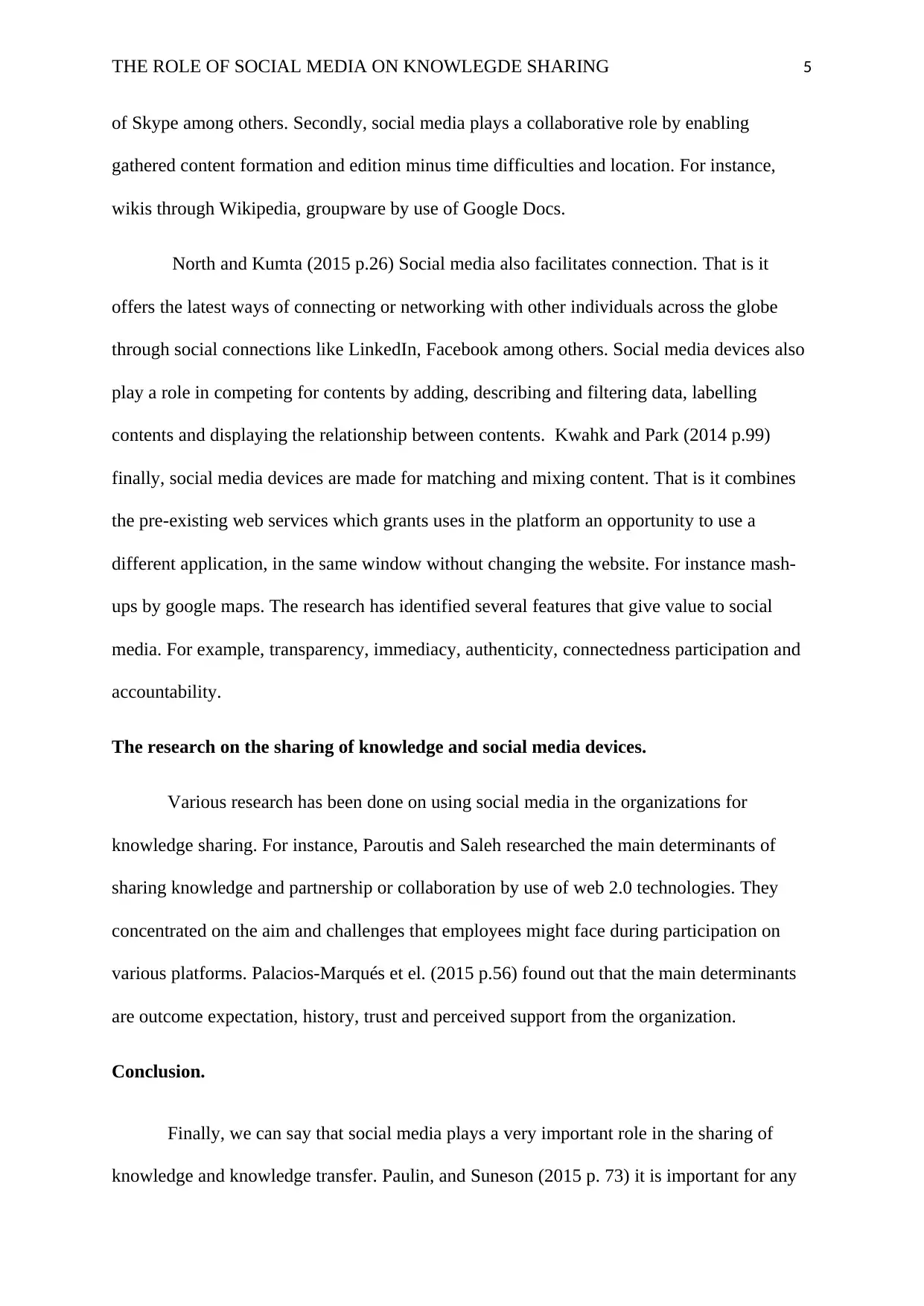
THE ROLE OF SOCIAL MEDIA ON KNOWLEGDE SHARING 5
of Skype among others. Secondly, social media plays a collaborative role by enabling
gathered content formation and edition minus time difficulties and location. For instance,
wikis through Wikipedia, groupware by use of Google Docs.
North and Kumta (2015 p.26) Social media also facilitates connection. That is it
offers the latest ways of connecting or networking with other individuals across the globe
through social connections like LinkedIn, Facebook among others. Social media devices also
play a role in competing for contents by adding, describing and filtering data, labelling
contents and displaying the relationship between contents. Kwahk and Park (2014 p.99)
finally, social media devices are made for matching and mixing content. That is it combines
the pre-existing web services which grants uses in the platform an opportunity to use a
different application, in the same window without changing the website. For instance mash-
ups by google maps. The research has identified several features that give value to social
media. For example, transparency, immediacy, authenticity, connectedness participation and
accountability.
The research on the sharing of knowledge and social media devices.
Various research has been done on using social media in the organizations for
knowledge sharing. For instance, Paroutis and Saleh researched the main determinants of
sharing knowledge and partnership or collaboration by use of web 2.0 technologies. They
concentrated on the aim and challenges that employees might face during participation on
various platforms. Palacios-Marqués et el. (2015 p.56) found out that the main determinants
are outcome expectation, history, trust and perceived support from the organization.
Conclusion.
Finally, we can say that social media plays a very important role in the sharing of
knowledge and knowledge transfer. Paulin, and Suneson (2015 p. 73) it is important for any
of Skype among others. Secondly, social media plays a collaborative role by enabling
gathered content formation and edition minus time difficulties and location. For instance,
wikis through Wikipedia, groupware by use of Google Docs.
North and Kumta (2015 p.26) Social media also facilitates connection. That is it
offers the latest ways of connecting or networking with other individuals across the globe
through social connections like LinkedIn, Facebook among others. Social media devices also
play a role in competing for contents by adding, describing and filtering data, labelling
contents and displaying the relationship between contents. Kwahk and Park (2014 p.99)
finally, social media devices are made for matching and mixing content. That is it combines
the pre-existing web services which grants uses in the platform an opportunity to use a
different application, in the same window without changing the website. For instance mash-
ups by google maps. The research has identified several features that give value to social
media. For example, transparency, immediacy, authenticity, connectedness participation and
accountability.
The research on the sharing of knowledge and social media devices.
Various research has been done on using social media in the organizations for
knowledge sharing. For instance, Paroutis and Saleh researched the main determinants of
sharing knowledge and partnership or collaboration by use of web 2.0 technologies. They
concentrated on the aim and challenges that employees might face during participation on
various platforms. Palacios-Marqués et el. (2015 p.56) found out that the main determinants
are outcome expectation, history, trust and perceived support from the organization.
Conclusion.
Finally, we can say that social media plays a very important role in the sharing of
knowledge and knowledge transfer. Paulin, and Suneson (2015 p. 73) it is important for any
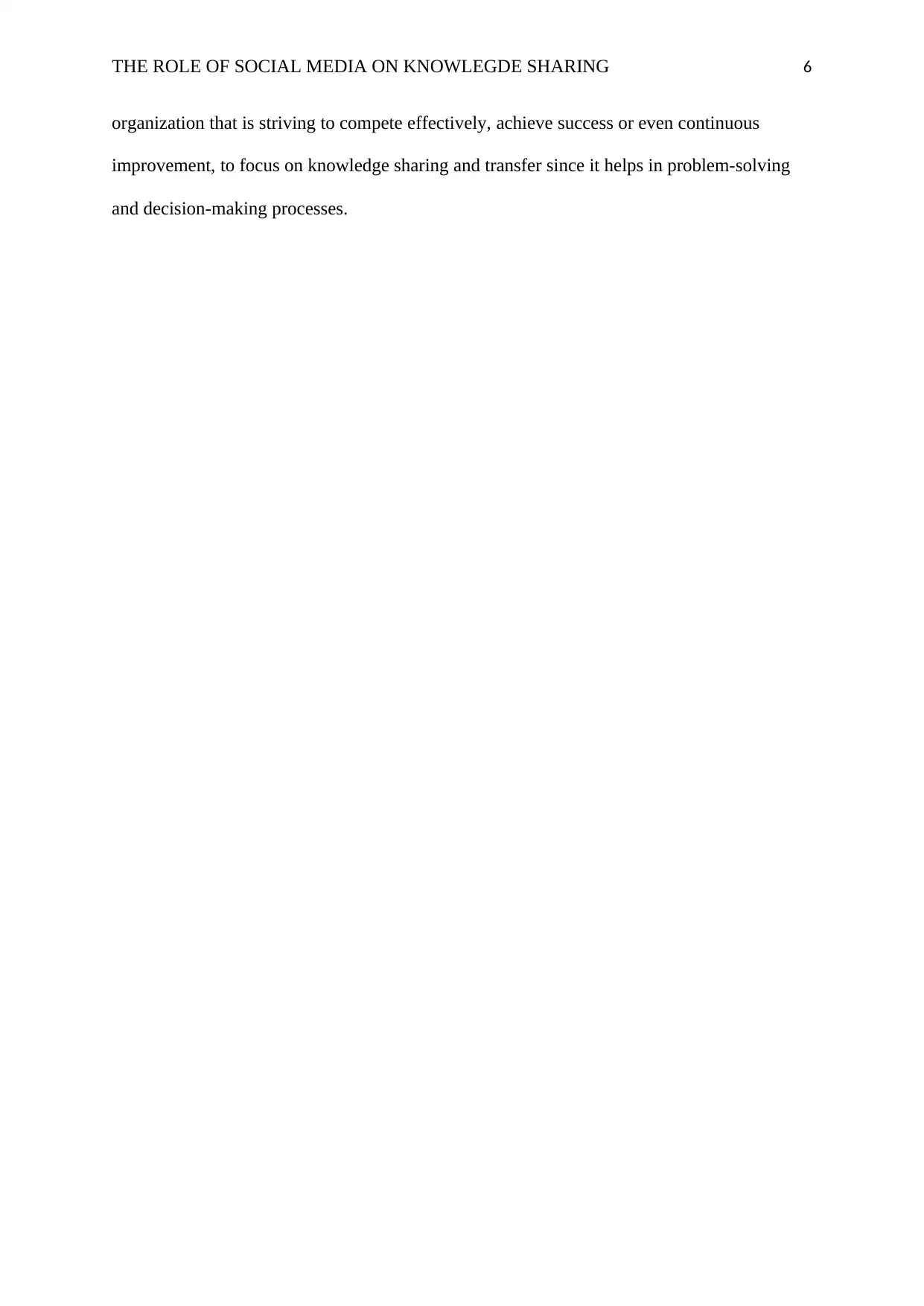
THE ROLE OF SOCIAL MEDIA ON KNOWLEGDE SHARING 6
organization that is striving to compete effectively, achieve success or even continuous
improvement, to focus on knowledge sharing and transfer since it helps in problem-solving
and decision-making processes.
organization that is striving to compete effectively, achieve success or even continuous
improvement, to focus on knowledge sharing and transfer since it helps in problem-solving
and decision-making processes.
⊘ This is a preview!⊘
Do you want full access?
Subscribe today to unlock all pages.

Trusted by 1+ million students worldwide
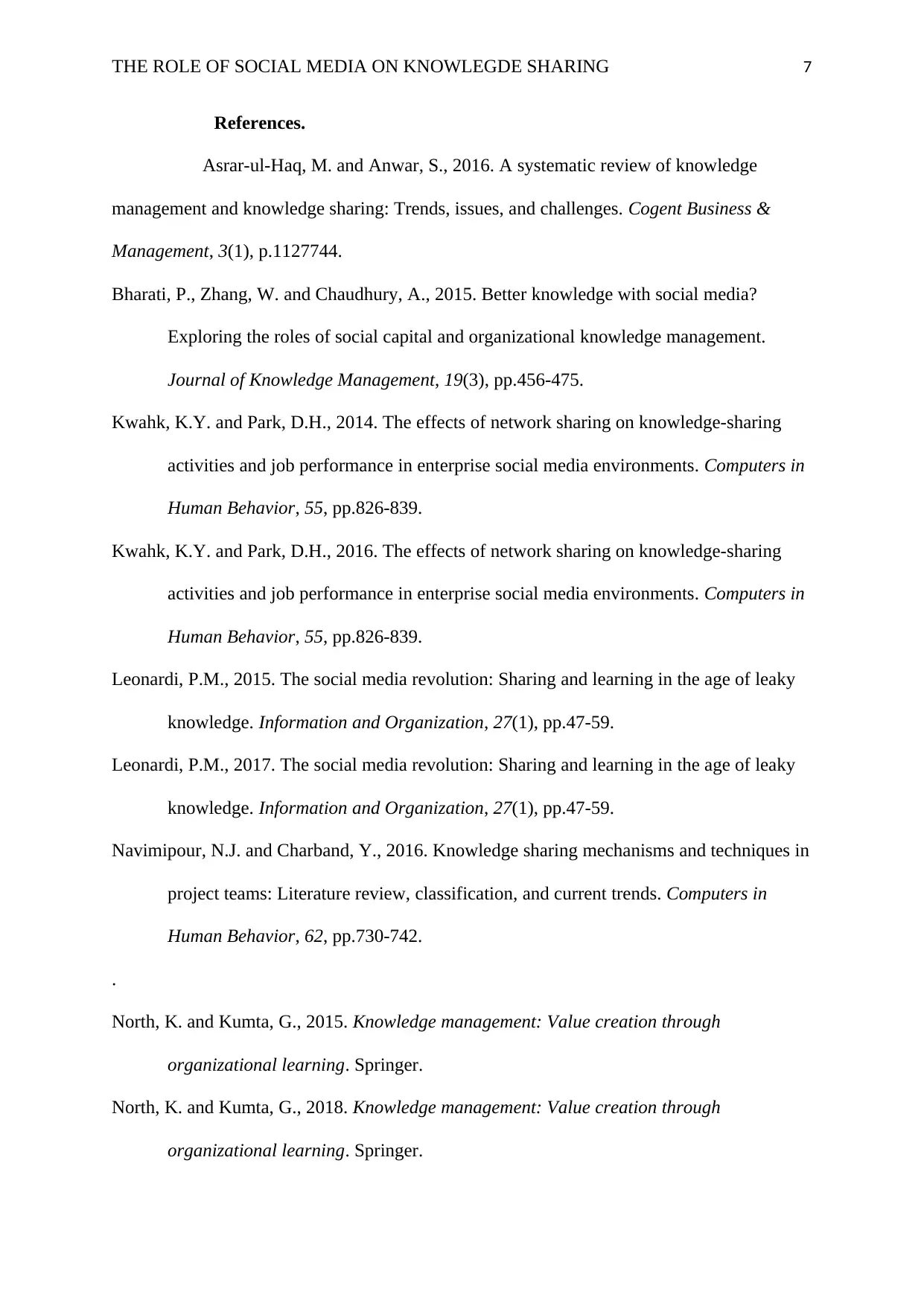
THE ROLE OF SOCIAL MEDIA ON KNOWLEGDE SHARING 7
References.
Asrar-ul-Haq, M. and Anwar, S., 2016. A systematic review of knowledge
management and knowledge sharing: Trends, issues, and challenges. Cogent Business &
Management, 3(1), p.1127744.
Bharati, P., Zhang, W. and Chaudhury, A., 2015. Better knowledge with social media?
Exploring the roles of social capital and organizational knowledge management.
Journal of Knowledge Management, 19(3), pp.456-475.
Kwahk, K.Y. and Park, D.H., 2014. The effects of network sharing on knowledge-sharing
activities and job performance in enterprise social media environments. Computers in
Human Behavior, 55, pp.826-839.
Kwahk, K.Y. and Park, D.H., 2016. The effects of network sharing on knowledge-sharing
activities and job performance in enterprise social media environments. Computers in
Human Behavior, 55, pp.826-839.
Leonardi, P.M., 2015. The social media revolution: Sharing and learning in the age of leaky
knowledge. Information and Organization, 27(1), pp.47-59.
Leonardi, P.M., 2017. The social media revolution: Sharing and learning in the age of leaky
knowledge. Information and Organization, 27(1), pp.47-59.
Navimipour, N.J. and Charband, Y., 2016. Knowledge sharing mechanisms and techniques in
project teams: Literature review, classification, and current trends. Computers in
Human Behavior, 62, pp.730-742.
.
North, K. and Kumta, G., 2015. Knowledge management: Value creation through
organizational learning. Springer.
North, K. and Kumta, G., 2018. Knowledge management: Value creation through
organizational learning. Springer.
References.
Asrar-ul-Haq, M. and Anwar, S., 2016. A systematic review of knowledge
management and knowledge sharing: Trends, issues, and challenges. Cogent Business &
Management, 3(1), p.1127744.
Bharati, P., Zhang, W. and Chaudhury, A., 2015. Better knowledge with social media?
Exploring the roles of social capital and organizational knowledge management.
Journal of Knowledge Management, 19(3), pp.456-475.
Kwahk, K.Y. and Park, D.H., 2014. The effects of network sharing on knowledge-sharing
activities and job performance in enterprise social media environments. Computers in
Human Behavior, 55, pp.826-839.
Kwahk, K.Y. and Park, D.H., 2016. The effects of network sharing on knowledge-sharing
activities and job performance in enterprise social media environments. Computers in
Human Behavior, 55, pp.826-839.
Leonardi, P.M., 2015. The social media revolution: Sharing and learning in the age of leaky
knowledge. Information and Organization, 27(1), pp.47-59.
Leonardi, P.M., 2017. The social media revolution: Sharing and learning in the age of leaky
knowledge. Information and Organization, 27(1), pp.47-59.
Navimipour, N.J. and Charband, Y., 2016. Knowledge sharing mechanisms and techniques in
project teams: Literature review, classification, and current trends. Computers in
Human Behavior, 62, pp.730-742.
.
North, K. and Kumta, G., 2015. Knowledge management: Value creation through
organizational learning. Springer.
North, K. and Kumta, G., 2018. Knowledge management: Value creation through
organizational learning. Springer.
Paraphrase This Document
Need a fresh take? Get an instant paraphrase of this document with our AI Paraphraser
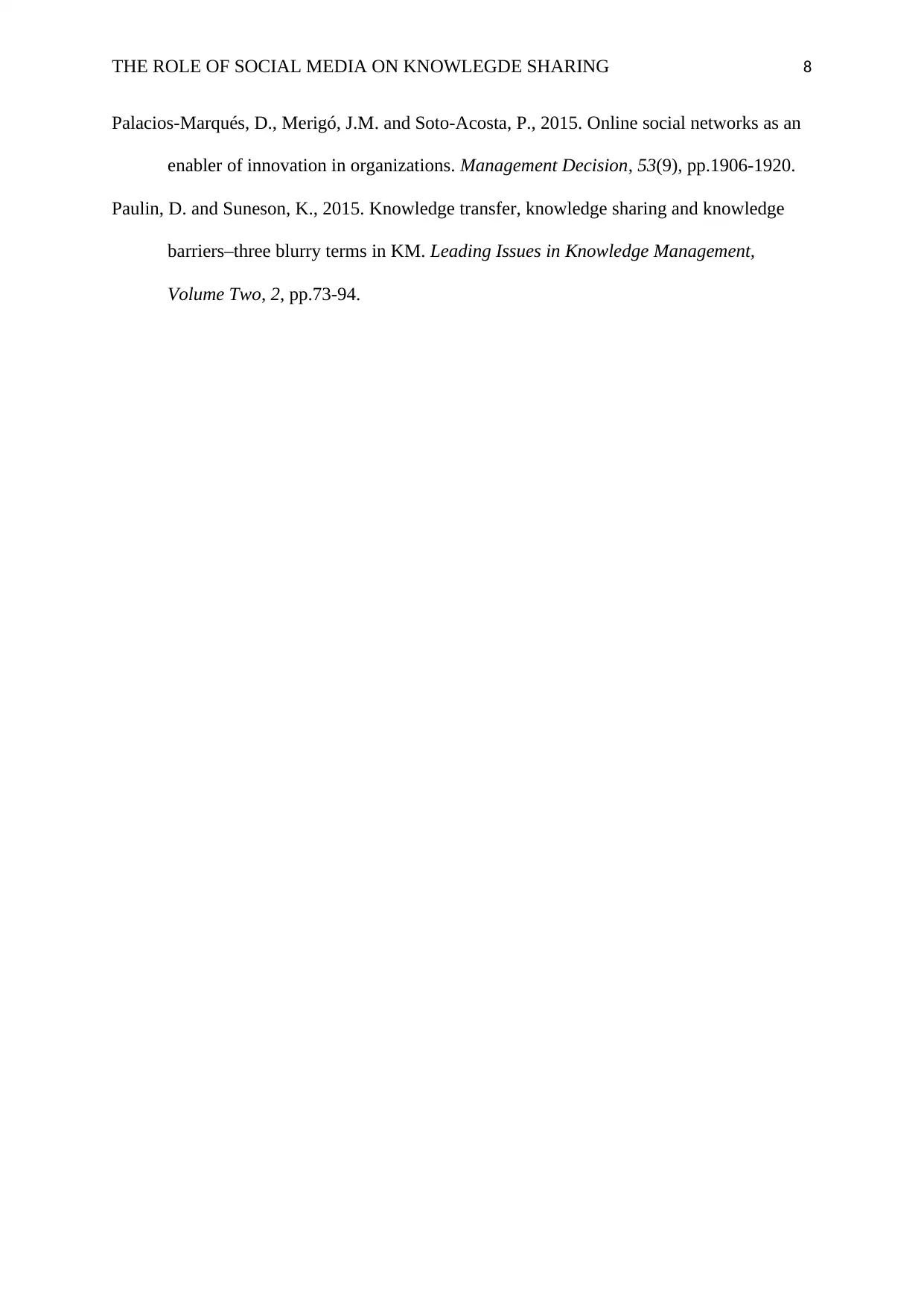
THE ROLE OF SOCIAL MEDIA ON KNOWLEGDE SHARING 8
Palacios-Marqués, D., Merigó, J.M. and Soto-Acosta, P., 2015. Online social networks as an
enabler of innovation in organizations. Management Decision, 53(9), pp.1906-1920.
Paulin, D. and Suneson, K., 2015. Knowledge transfer, knowledge sharing and knowledge
barriers–three blurry terms in KM. Leading Issues in Knowledge Management,
Volume Two, 2, pp.73-94.
Palacios-Marqués, D., Merigó, J.M. and Soto-Acosta, P., 2015. Online social networks as an
enabler of innovation in organizations. Management Decision, 53(9), pp.1906-1920.
Paulin, D. and Suneson, K., 2015. Knowledge transfer, knowledge sharing and knowledge
barriers–three blurry terms in KM. Leading Issues in Knowledge Management,
Volume Two, 2, pp.73-94.
1 out of 8
Related Documents
Your All-in-One AI-Powered Toolkit for Academic Success.
+13062052269
info@desklib.com
Available 24*7 on WhatsApp / Email
![[object Object]](/_next/static/media/star-bottom.7253800d.svg)
Unlock your academic potential
Copyright © 2020–2026 A2Z Services. All Rights Reserved. Developed and managed by ZUCOL.





